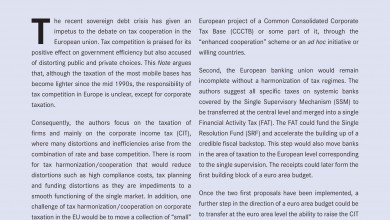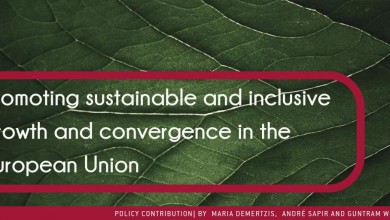2014 will be remembered for two major unexpected developments. First, the European Union was caught by surprise by the return of geopolitics. The annexation of Crimea, the military conflict in Ukraine and the increasing tensions between Putin’s Russia and western leaders were unexpected. The conflicts in Iraq and Syria and the rise of ISIS extremists found the West equally unprepared. One can speculate if the economic and political weakness of the West in recent years has contributed to the rise of alternative political concepts. But certainly, European Union countries have realised that these conflicts on their doorstep matter. From an economic point of view, these events have arguably had negative effects on confidence and have – together with the sanctions imposed on Russia – contributed to disappointing growth figures. Also of concern are the direct effects on trade and especially on the security of energy supply.
Second, the economic performance of the euro area has fallen on the wrong side of official forecasts. In November last year the European Commission predicted real GDP growth of 1.1 percent for the euro area in 2014, but these numbers have been revised downward to 0.8 percent. Inflation has been subject to similar revisions, and is dangerously low to achieve debt sustainability and price adjustment. Some progress has been made with unemployment but it is slow and numbers continue to disappoint in Italy in particular.
Given this backdrop, it is clear that Europe’s New Year’s resolution should be to implement policies needed to reduce military conflicts in EU neighbouring countries, and to increase growth and jobs.
For sure, a clear priority for 2015 will be to manage proactively the fallout from a possible continuation of the conflict with Russia. I would certainly emphasise the importance of reducing our collective dependence on gas imports and strengthening our single market for energy. In particular, we should ensure the energy security of all EU member states. The European Commission’s work on the so-called Energy Union is central in this respect. Constantly reviewing whether the sanctions against Russia are actually effective is also essential to justify their continuation, despite their negative impact on economic growth in the EU and in Russia.
Furthermore, the euro area must amplify its efforts jumpstart growth and create new job opportunities. To grow, Europe needs to invest. The decline in investment in the last seven years has been substantial and the EU is now well below long-term investment trends. A major reason for such weak investment is a lack of trust and confidence. Consequently, one of the most important challenges for policymakers will be to focus on increasing private-sector confidence. Predictability of policy is central. Even more important is regaining trust among European partners.
Such lack of trust is partly caused by different intellectual traditions and, by diverging interpretations around the main causes of the current crisis and contrasting views regarding the appropriate measures needed to tackle it. These differences in analysis between mostly Germany-based and other economists translate into different assessments and undermine mutual trust. This mistrust among European partners is in turn perceived negatively by investors.
We need to overcome the polarisation of this debate and acknowledge that the euro area has both significant structural problems and significant demand-side problems. Low productivity growth and substantial divergences in competitiveness and unit labour costs in different EU countries call for bold structural reforms. Such reforms should include, for example, better training to help jobseekers find new jobs in different sectors. These reforms will be mostly national but also new initiatives that deepen the single market, for example for digital services, are also fundamental to boosting productivity and creating new investment opportunities.
Initiatives that help kick-start demand in the euro area are equally important. The European Central Bank has been far too slow to react to the deteriorating inflation outlook and needs to be more proactive in 2015. However, monetary policy alone will not be sufficient. As well as improving the framework conditions for private investment, the EU should mobilise public resources for public investment projects. While the investment plan set out by European Commission president Jean-Claude Juncker is an improvement in this respect, the public resources earmarked are clearly insufficient and a top-up will be needed. The EU will also have to become bolder in tackling the banking problems that still weigh on credit and lending in a number of countries. More policy initiatives are required to re-ignite growth in the EU.


